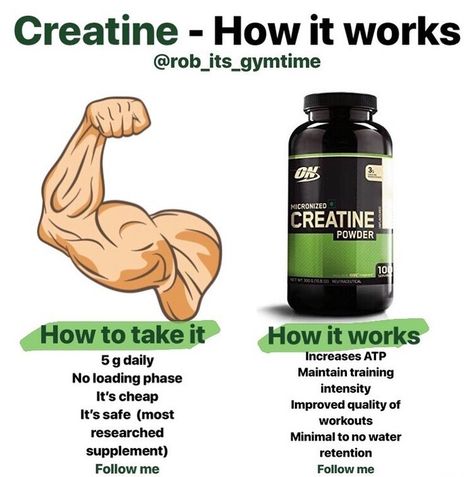Creatine: Benefits, Side Effects, And Who Should Use It

Table of Contents
The Science-Backed Benefits of Creatine
Creatine monohydrate is a naturally occurring compound found in small amounts in meat and fish. As a supplement, it's incredibly popular amongst athletes and fitness enthusiasts due to its proven efficacy in enhancing various aspects of physical performance and muscle growth.
Increased Strength and Power
Creatine supplementation leads to significant increases in strength and power output, particularly during high-intensity activities. This is primarily due to its role in improving the production of adenosine triphosphate (ATP), the body's main energy currency.
- Improved ATP Production: Creatine increases the availability of ATP within muscle cells, fueling muscle contractions and resulting in more explosive movements.
- Enhanced Performance Across Activities: Studies have demonstrated benefits across a wide range of sports and fitness activities, including weightlifting, sprinting, and high-intensity interval training (HIIT).
- Strength Training and Powerlifting: Creatine is particularly effective for individuals involved in strength training and powerlifting, contributing to significant gains in strength and power.
Enhanced Muscle Growth (Hypertrophy)
Beyond strength and power, creatine also plays a vital role in promoting muscle growth, a process known as hypertrophy.
- Cell Volumization: Creatine helps increase muscle cell volume (cell volumization) by drawing water into the muscle cells. This increased volume creates a more anabolic environment.
- Increased Protein Synthesis: The increased cell volume stimulates muscle protein synthesis, the process by which your body builds new muscle tissue. This leads to greater muscle mass over time.
- Synergy with Resistance Training: Combining creatine supplementation with a consistent resistance training program maximizes its muscle-building effects. You'll see optimal results by pairing your creatine intake with a well-structured workout routine.
- Visible Results: Many individuals experience visible increases in muscle mass within a few weeks of consistent creatine use and proper training.
Improved Cognitive Function
While primarily known for its physical benefits, emerging research suggests that creatine may also improve certain aspects of cognitive function.
- Memory and Reasoning: Some studies indicate that creatine supplementation may enhance memory, reasoning, and other cognitive processes.
- Neurological Conditions: Research is ongoing to explore creatine's potential benefits for individuals with neurological conditions, such as Alzheimer's disease or traumatic brain injury.
- Further Research Needed: While promising, more large-scale studies are needed to fully understand the extent and mechanisms of creatine's effects on cognitive performance. This area of creatine research is rapidly expanding, with exciting potential for future applications.
Potential Side Effects of Creatine
While generally considered safe, creatine supplementation can cause some side effects in certain individuals. It's important to be aware of these potential issues.
Mild Gastrointestinal Issues
The most common side effects are mild gastrointestinal issues.
- Bloating, Nausea, Diarrhea: Some users experience bloating, nausea, or diarrhea, particularly when starting with high doses.
- Dosage and Form: These side effects can often be mitigated by gradually increasing the dosage or switching to a different form of creatine, such as creatine HCL.
- Hydration: Maintaining adequate hydration is crucial to minimize gastrointestinal discomfort.
Water Retention
Creatine's mechanism of action involves drawing water into muscle cells.
- Temporary Weight Gain: This can lead to temporary weight gain, often mistaken for fat gain. This is primarily due to water retention and not actual fat accumulation.
- Harmless Side Effect: This water retention is generally considered a harmless side effect and usually subsides once you stop supplementing.
- Performance Benefit: The increased hydration can actually be beneficial for muscle performance and endurance.
Rare, More Serious Side Effects
While rare, more serious side effects are possible.
- Kidney Problems and Muscle Cramps: These are more likely to occur in individuals with pre-existing kidney conditions or other health issues.
- Improper Usage: Improper usage, such as taking extremely high doses, can also increase the risk of adverse effects.
- Consult Your Doctor: If you have any pre-existing health conditions, it is crucial to consult your doctor before starting creatine supplementation.
Who Should Use Creatine and Who Shouldn't?
Creatine is a powerful supplement, but it's not suitable for everyone.
Ideal Candidates
Creatine is particularly beneficial for certain individuals.
- High-Intensity Athletes: Those engaging in high-intensity exercise like weightlifting, sprinting, and other power-based activities will see the most significant benefits.
- Strength and Performance Improvement: Athletes looking to enhance strength, power, and overall athletic performance can greatly benefit from creatine supplementation.
- Muscle Mass Gain: Individuals aiming to increase muscle mass and improve body composition can utilize creatine to support their goals.
Those Who Should Avoid Creatine
Some individuals should avoid creatine supplementation.
- Kidney Disease: Individuals with kidney disease or other pre-existing health conditions should avoid creatine unless explicitly advised otherwise by their doctor.
- Pregnant or Breastfeeding Women: Pregnant or breastfeeding women should consult their doctor before using creatine.
- Consult a Physician: It's always best to consult a healthcare professional before starting any new supplement regimen, including creatine.
Conclusion
Creatine monohydrate is a well-researched and effective supplement that offers significant benefits for strength, power, muscle growth, and potentially even cognitive function. While mild side effects are possible, they are generally manageable. However, it's crucial to understand who should use creatine and who should avoid it. Before incorporating creatine into your routine, consider your health status and consult with a healthcare professional. If you're looking to enhance your athletic performance and build muscle, learn more about the right creatine dosage and usage to maximize its benefits. Remember to always prioritize your health and consult a doctor before starting any new supplement regimen. Start your journey towards improved performance with creatine today!

Featured Posts
-
 Follow The La Lakers Season News Games And More On Vavel Us
May 16, 2025
Follow The La Lakers Season News Games And More On Vavel Us
May 16, 2025 -
 V Mware Costs To Soar 1 050 At And T On Broadcoms Extreme Price Increase
May 16, 2025
V Mware Costs To Soar 1 050 At And T On Broadcoms Extreme Price Increase
May 16, 2025 -
 Partido Venezia Napoles Online En Directo
May 16, 2025
Partido Venezia Napoles Online En Directo
May 16, 2025 -
 Alex Ovechkin Nears Gretzkys Nhl Goal Record 893 And Counting
May 16, 2025
Alex Ovechkin Nears Gretzkys Nhl Goal Record 893 And Counting
May 16, 2025 -
 Almeria Vs Eldense En Vivo Minuto A Minuto De La Liga Hyper Motion
May 16, 2025
Almeria Vs Eldense En Vivo Minuto A Minuto De La Liga Hyper Motion
May 16, 2025
